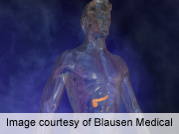- Double Mastectomy May Offer No Survival Benefit to Women With Breast Cancer
- Toxic Lead Found in Cinnamon Product, FDA Says
- Certain Abbott Blood Sugar Monitors May Give Incorrect Readings
- Athletes Can Expect High Ozone, Pollen Counts for Paris Olympics
- Fake Oxycontin Pills Widespread and Potentially Deadly: Report
- Shingles Vaccine Could Lower Dementia Risk
- Your Odds for Accidental Gun Death Rise Greatly in Certain States
- Kids From Poorer Families Less Likely to Survive Cancer
- Tough Workouts Won’t Trigger Cardiac Arrest in Folks With Long QT Syndrome
- At-Home Colon Cancer Test Can Save Lives
Chemo After Surgery Prolongs Life in Pancreatic Cancer Patients, Study Finds


TUESDAY, Oct. 8Treating pancreatic cancer patients with the chemotherapy drug gemcitabine (Gemzar) after surgery improved survival rates when compared to doing nothing, German researchers report.
However, one expert noted that the finding may not be clinically relevant anymore.
The trial showed the benefit of treatment over no treatment, said Dr. Nilofer Azad, director of the Phase 1 Clinical Trials Group at Johns Hopkins Kimmel Cancer Center in Baltimore. “But more recently, the question has turned to what should that treatment be, not whether there should be a treatment,” Azad noted.
Today, no patients would be randomized to no therapy, she added. “There are other drug combinations that we are looking at now. There are other novel treatments and experimental therapies we are looking at. Those are the open questions,” Azad said.
For example, the findings of a Japanese study published in the April 1 issue of the Journal of Clinical Oncology showed that an experimental drug plus gemcitabine improved survival longer than either drug alone, she noted.
Despite these advances, the overall picture for pancreatic cancer remains bleak, Azad added.
“It’s still depressing. Pancreatic cancer still has the worst cure rate of any solid tumor. It’s the fifth-leading killer even though it’s rarer than common cancers, and we haven’t made a substantial impact on it,” she said.
What is really needed is a way to diagnose pancreatic cancer early, when it is still curable. “The best way we can lower the death rate from pancreatic cancer is to diagnose it when it is very early on,” Azad stressed.
The latest report was published in the Oct. 9 issue of the Journal of the American Medical Association.
For the study, a team led by Dr. Helmut Oettle, of the Charite-Universitatsmedizin in Berlin, gathered data on 354 patients with pancreatic cancer who had their tumor removed. These patients were randomly assigned to six months of treatment with gemcitabine or observation alone.
The patients began the study between July 1998 and December 2004, and were followed until September 2012.
By September 2012, 308 patients (87 percent) had relapsed. The average disease-free survival was 13.4 months among patients who received gemcitabine, compared with 6.7 months among those who received no treatment, the researchers found.
At the end of the study, 316 patients (nearly 90 percent) had died and 38 patients were still alive. Of those still living, 23 had been treated with gemcitabine while 15 hadn’t, the study authors noted.
Oettle’s group found a statistically significant difference in overall survival between the groups, with an average of 22.8 months for those taking gemcitabine, compared with 20.2 months for those in the observation-only group.
Among patients who received gemcitabine there was also a statistically significant absolute 10.3 percent improvement in five-year survival, compared with those who received no treatment (20.7 percent versus 10.4 percent) and a 4.5 percent improvement in the 10-year survival (12.2 percent versus 7.7 percent), the researchers found.
More information
For more on pancreatic cancer, visit the U.S. National Cancer Institute.
Source: HealthDay
Copyright © 2024 HealthDay. All rights reserved.










